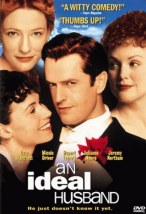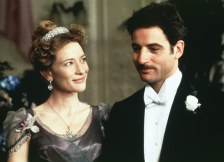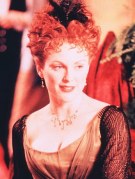|
|
||
 |
UK/USA, 1999. Rated PG-13. 97 minutes. Cast: Rupert Everett, Jeremy Northam,
Julianne Moore, Cate Blanchett, Minnie Driver, John Wood, Lindsay Duncan,
Peter Vaughan |
|
| Grade: C+ | Review by Carlo Cavagna |
|
|
||
 |
UK/USA, 1999. Rated PG-13. 97 minutes. Cast: Rupert Everett, Jeremy Northam,
Julianne Moore, Cate Blanchett, Minnie Driver, John Wood, Lindsay Duncan,
Peter Vaughan |
|
| Grade: C+ | Review by Carlo Cavagna |
![]() ased
on the Oscar Wilde play, An Ideal Husband, a comedy of manners about
the pedestals upon which we place people and the unrealistic expectations we
have of them, is as relevant today as it was when it was written 100 years ago.
Who among us can withstand an examination of every detail of our lives? Isn't
who we are today more important than who we might have been yesterday?
ased
on the Oscar Wilde play, An Ideal Husband, a comedy of manners about
the pedestals upon which we place people and the unrealistic expectations we
have of them, is as relevant today as it was when it was written 100 years ago.
Who among us can withstand an examination of every detail of our lives? Isn't
who we are today more important than who we might have been yesterday? 
Apparently not. Jeremy Northam (The Winslow
Boy, The Net) is Sir Robert Chiltern, a member of Parliament and rising
political star idealized by his wife (Cate Blanchett) and the public. Chiltern
is a man of impeccable honesty and integrity, but it seems even he may have
committed a youthful indiscretion. Unfortunately for him, the widowed Mrs. Cheveley
(Julianne Moore) knows about it. She makes him a proposition. Either Chiltern
protects her investments by throwing his support behind a dubious government
project, or she will expose his secret. At a loss, Chiltern turns for help to
his close friend Lord Goring (Rupert Everett), playboy, womanizer, and one-time
fiancé of Cheveley. A man who has never taken anything in life seriously, Goring
must now help save his friend's career and marriage. Meanwhile, Chiltern's sister
Mabel (Minnie Driver), a largely extraneous character in this screen adaptation,
has her romantic sights set on Goring. 
An Ideal Husband is superficially engaging, but the story flows fitfully, with abrupt plot transitions and questionable character development. An apparent change in Cheveley's witch-like personality is particularly precipitous. Moore doesn't help matters by playing Cheveley just a bit over the top, as she so often does–her performance in The End of the Affair being a notable exception. By convincing us that Cheveley is thoroughly ruthless and unscrupulous, Moore makes it impossible for us to believe that she might behave any differently. When she alters the goal of her scheme, it feels false, particularly because nothing in the script provides a satisfying reason for it. Mabel's infatuation with Goring remains similarly unmined. An Ideal Husband asks us to accept it at face value, without a clue to what drives her character. She has no concrete role in the film other than to wait for Goring to propose.
These problems are in part attributable to differences between modern and Edwardian society. Mabel's behavior is more comprehensible considering that in those days, privileged young women were trained to think of nothing but marriage. [A minor spoiler follows:] Similarly, in an era when women's wealth and prestige derived almost exclusively from their husbands, Cheveley's offer to surrender her incriminating evidence in exchange for Goring's hand in marriage can be seen as just another unscrupulous act designed to improve her social position. [End spoiler] Unfortunately, this is mere speculation, because nothing in writer/director Oliver Parker's adaptation sheds light on Mabel or Cheveley's motivations.
|
The Big Picture |
|
| Carlo |
|
| Glenda |
|
| JCC |
|
| Pagoda |
|
| Spunkee |
|
| Vornporn |
|
The unevenness of the narrative suggests that Parker cut out significant portions of Wilde's play that might have fleshed out the characters and smoothed over the plot difficulties, and indeed, this is the case. A notable problem unrelated to Parker's adaptation, however, is that Everett does not make a plausibly dashing and charismatic rogue in the film's central role. In fact, he seems rather bored, delivering some of Wilde's best lines with disinterest. In an interview, Everett explained that he didn't want to overplay those moments. However, he holds back too much, depriving the verbal interplay of its spark. His low key style is most humorous when Goring is interacting with his disapproving father (John Wood), who finds his indifference infuriating.
Wilde's wit and fine acting from Northam and the supporting cast save An Ideal Husband from mediocrity. Cate Blanchett, who is fast taking her place as one of filmdom's most talented actresses (somebody please give her another leading role soon!), is particularly memorable in what could have been a thankless wife role. The net result is that An Ideal Husband is pleasantly diverting, but it's unlikely to inspire the kind of deep thinking about hypocrisy and unreasonable standards of virtue that Wilde may have intended. Given that An Ideal Husband clocks in at just over 90 minutes in this year of the three hour movie, Oliver Parker could have given the story more substance by preserving more of Wilde's original work.
Review
© February 2000 by AboutFilm.Com and the author.
Images © 1999
Miramax. All Rights Reserved.
 |
|